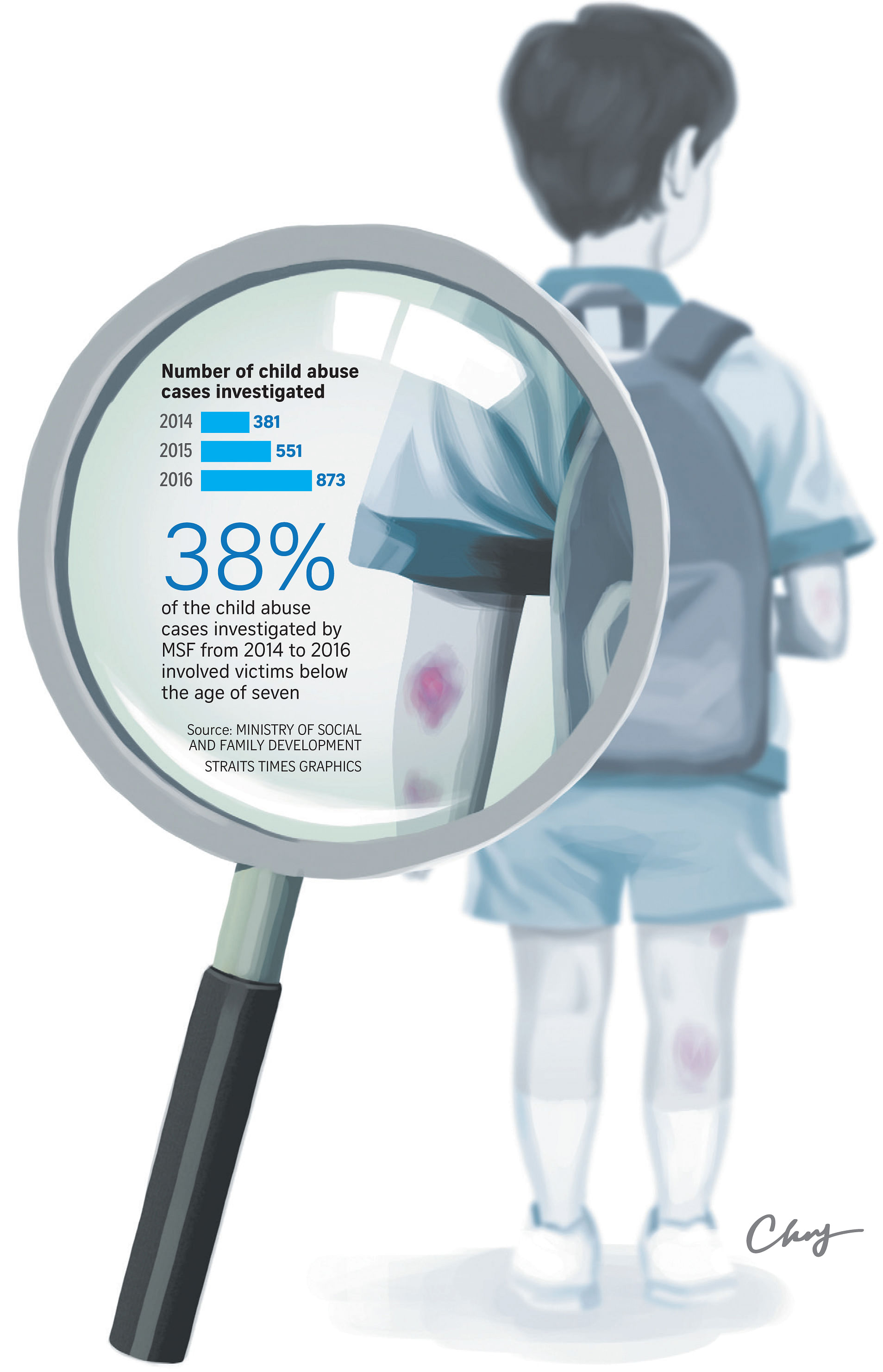Nearly 40 per cent of child abuse cases investigated by the Ministry of Social and Family Development (MSF) in the past three years involved victims younger than seven, The Straits Times has learnt.
Yet, pre-schools have been found to be inadequate in spotting signs of child abuse, said experts, who called for regular standardised training for the teachers, which is currently not available.
This is important as many child abusers are immediate family members and pre-school educators become an important line of defence for the children, they said.
Child abuse includes physical abuse, sexual abuse, emotional or psychological abuse and neglect. They involve children up to age 16. MSF investigates cases in which the abuse happens within the family.
Over the years, the number of child abuse cases has shot up.
It more than doubled from 381 in 2014, to 873 last year. In 2015, there were 551 cases.
The authorities have said this is due to more rigorous screening tools that improved the detection and reporting of cases, and more people being trained by MSF to use these tools.

In a statement to The Straits Times last week, the Early Childhood Development Agency (ECDA) and MSF's Child Protective Service said that more will be done to train pre-school educators.
A system with an online manual that guides them on when and how suspected child abuse cases should be reported to the ministry will be rolled out from next month.
Online child protection training modules - which instructs pre- school educators in areas such as spotting signs of child abuse and using the screening tools - are also "in the early stages of development, and will undergo testing and enhancements before (being) made available in late 2018".
Currently, a 23-page Sector-Specific Screening Guide for educators is on ECDA's Child Care Link website for pre-school educators to refer to. It gives examples of situations that they are likely to encounter - including potential child abuse cases - and is meant to help them know which concerns should be reported to the ministry.
But a recent survey by the Singapore Children's Society (SCS) suggests that pre-school teachers are not well-trained in handling child abuse cases or are not aware of the resources available (see other story).
It polled 336 pre-school staff, of whom 60 per cent had more than 10 years of experience and 62 per cent were in leadership or management positions. Just over a quarter of those polled said they knew of the guide for educators.
The level of training in handling suspected child abuse cases - for would-be educators before they are certified - also seems to be patchy.
Seed Institute, the largest pre-school training provider, said all its diploma and certificate courses have content on this topic. Students learn about spotting signs of child abuse, reporting procedures and working with families in a two-hour session. Ngee Ann Polytechnic, which offers a diploma in early childhood education, said about eight hours is spent on covering content on child protection.
SCS' course for pre-school teachers on handling suspected sexual abuse cases and imparting body safety skills to children - including how to differentiate between good and bad touches - lasts a full day. But this is an optional course and costs pre-schools $194 per participant, before subsidies.
Dr Rebecca Chan, a pre-school consultant with more than 18 years of experience, noted that all pre- school educators have to be certified first aiders, and suggested that training on handling suspected child abuse cases be done as part of refresher courses in first aid. First aid certificates are valid for two years.
SCS' chief executive Alfred Tan and educators agreed that it was vital for such training to "not be a one-off affair".
MacPherson Sheng Hong Childcare Centre principal Wendy Tan said: "It would be good for training to be done regularly because after a while, the knowledge could be forgotten or we take it for granted."
One of the survey respondents also suggested a registry of suspected child abuse cases, saying that parents sometimes re-enrol the child in another school where the abuse has not detected.
Mr Tan said: "Some pre-schools may worry that it would be troublesome to flag cases or that parents would be unhappy. But the child's best interests should be paramount."

